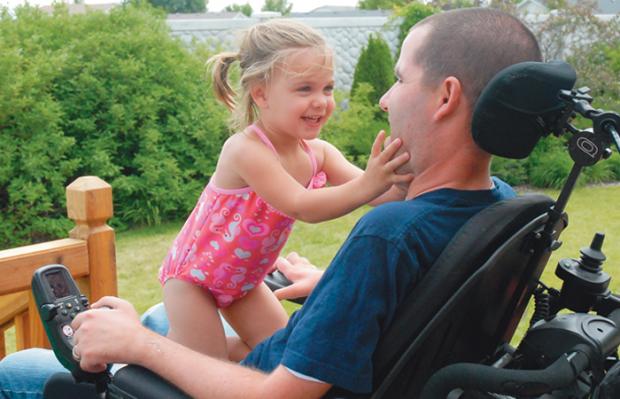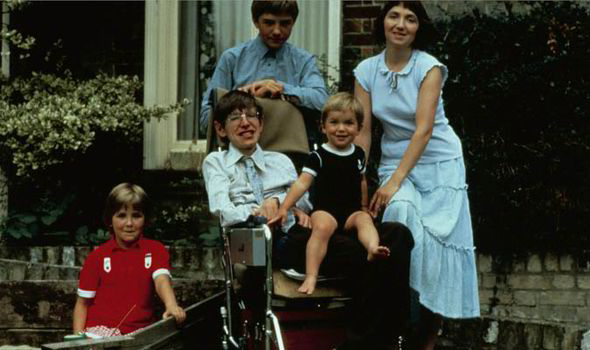It is not easy to love someone who is sick; it is especially difficult when it comes to loving someone who has ALS.
ALS is a motor-neuron disease, commonly known in the USA as Lou Gehrig’s disease. It strikes certain cells in the spinal cord and brain, making it difficult or even impossible to move. It starts by making a patient generally weak, unable to lift things and walk and then talk and even swallow. The disease is mostly diagnosed among people of 50 years and older. But there are cases when young people or even children are diagnosed with a light form of ALS. True love is unconditional, but ALS tests everyone. Understanding how a person with ALS feels will help you deal with the hard mental and physical work it requires.
1. ALS is not a death sentence.
Although statistics are rather sad, there are people diagnosed with ALS who have managed to live to see their grandchildren. Take Stephen Hawking as the best example. The world’s smartest man was diagnosed with ALS when he was 21. Soon, he will be celebrating his 70th birthday. Being wheelchair-bounded, he helped to formulate ideas on quantum gravity and black holes. His books are bestsellers, and his life is a legend. Although he lost the ability to move or speak, he has been working as a professor at Cambridge for over 30 years and became director of research at the center of Theoretical Cosmology.
2. It is not their fault.
ALS can happen to anybody with no clearly associated risk factors. Only 10 percent of ALS cases are genetic or based on gene mutation. Most people die from respiratory failure caused by ALS approximately 3-5 years from the onset of symptoms. Nevertheless, there are those who manage to live 15 years or more.
3. They need your help.
No one can deny that people with ALS need help. It is going to take a lot of time and adjustment to learn how to help your friend with ALS. Be patient and listen very attentively to what they say or show you.
4. They can sometimes cry or laugh uncontrollably.
People who have ALS can sometimes experience uncontrollable laughter or crying without feeling particularly happy or sad. This effect is mostly seen in people suffering from upper motor neuron disease. Although this has nothing to do with actual depression, it has been successfully cured with antidepressants.
5. ALS doesn’t affect them mentally.
They are the same people they used to be. Yes, they cannot walk, lift things, or in some cases even talk. But just because they have changed physically doesn’t mean that they have changed mentally. They are still your best friend, cousin, wife, or mother. Treat them the same way you used to.
.
6. They can hear you well.
The biggest stereotype for people with ALS is that they cannot hear you well. Motor-neuron disease does not affect hearing. Talking loud or screaming will not make them answer faster.
7. They are smart.
Those suffering from ALS are able to use their brain’s potential to the fullest. They can even concentrate on everything amazingly. They are big book warms and excellent scientists, businessmen, directors, and journalists.
8. They can be sexually active.
ALS does not affect sexuality. Sufferers can be sexually active and even have children. Stephen Hawking, for example, has three beautiful kids who don’t have their father’s disease. The only thing that can make sexual relationship difficult is difficulties with the respiratory system. Nevertheless, there are special positive pressure ventilation systems that can help.
9. They have a good sense of humor.
In order to survive through hard times, you have to have an excellent sense of humor. ALS patients can be extremely funny when you get to know them. If you want to help them and show your love, you need to make jokes and tell funny stories, and you will see that it works both ways. Our ALS hero Mr. Hawking is known throughout the world for his exquisite sense of humor.
10. They can tell you more about life than you think.
Spending time with people who have ALS is a great experience. These people are alone with their thoughts a great deal of the time, so when they finally talk, they surprise you with accuracy and wisdom. You cannot help but be inspired by people who have lost everything at one point and gained even more than we can imagine.
11. They can continue leading a normal life.
Although normal is an abstract word when it comes to ALS, it has been proven that people suffering from this disease can continue leading a normal life. They can work (if it doesn’t involve physical labor), they can communicate with friends, watch movies, enjoy entertainment, and even travel.















































